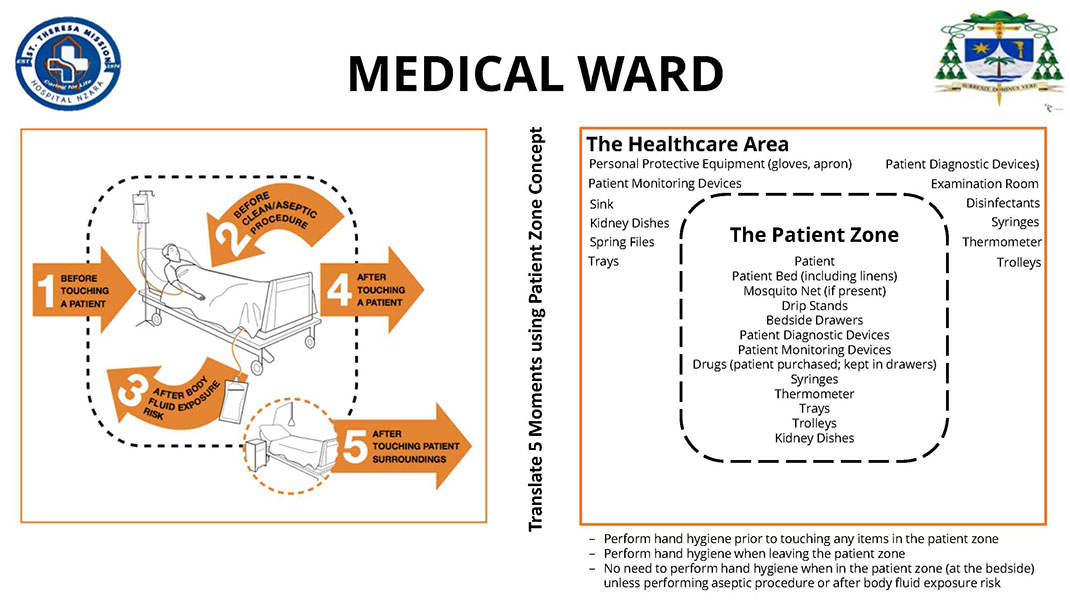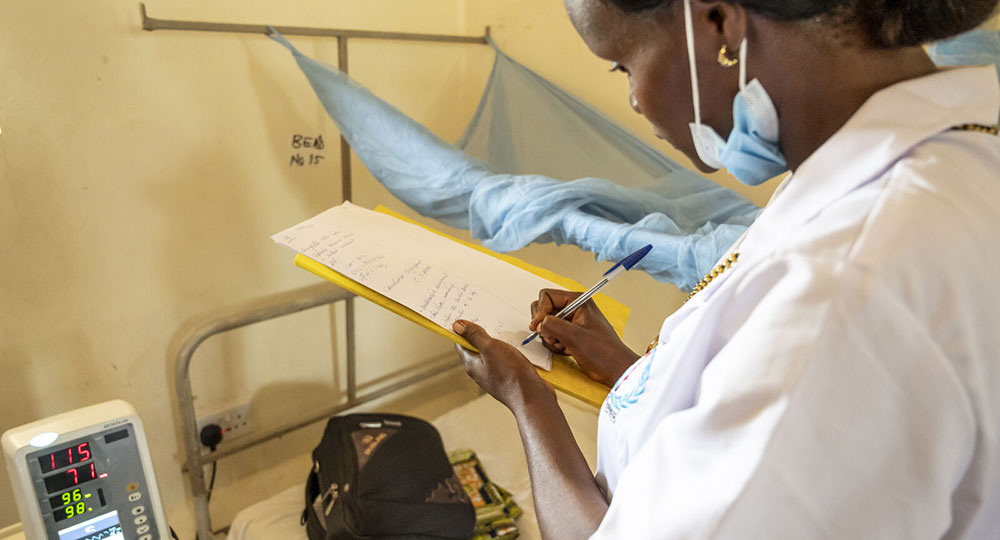Hand in Hand Across Borders: Progress in Infection Prevention
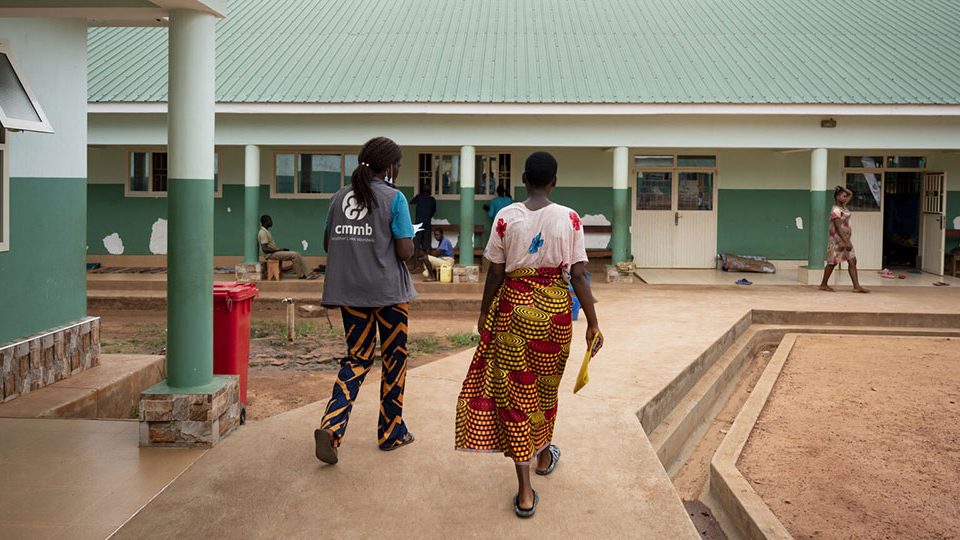
With local leadership and remote volunteer support, South Sudan’s St. Theresa Mission Hospital is becoming a model for infection prevention in the region.
St. Theresa Hospital is a lifeline for the people of Nzara, South Sudan and its surrounding areas. Its importance in the region has only grown following the closure of several government-led facilities, which were already sparse. Despite the increasing number of patients seeking care at St. Theresa Hospital, the health professionals who serve within its walls have stepped up with grace and commitment. While the need for quality care grew, so too did St. Theresa’s capacity to provide it—notably through a comprehensive initiative to strengthen infection prevention protocols. Improvement is continuous, but the impact so far has been transformational.
Where We Started: CMMB Volunteers Launch Infection Prevention Initiative
In 2022, Dr. Maad Top, the then new medical director at St. Theresa Mission Hospital, identified a critical need to improve the hospital’s infection prevention protocols. Many of the facility’s initial challenges in that area were the result of resource shortages and lack of formal policies. Access to personal protective equipment, hand-washing stations, and effective hand sanitizer, was unreliable or nonexistent. Other concerns included sometimes improper sanitation and disposal of medical equipment, as well as the facility’s remote location and proximity to livestock. Understanding Dr. Maad Top’s vision for the future of St. Theresa, CMMB connected him with, Dr. Helene Calvet, a U.S.-based physician and public health specialist. As a longtime CMMB volunteer, Dr. Helene serves in a remote capacity. She compliments her work with in-person visits for assessment and training when needed. She joined Dr. Maad Top at St. Theresa Hospital to engage its newly appointed infection prevention committee, conduct an assessment on current practices, and recommend areas of focus.
It wasn’t long after that initial assessment that Claire Jai, an infection prevention specialist, joined the project team—also in a remote volunteer role. With over 15 years of experience in infection prevention in the U.S. and Africa, her contributions to the initiative were invaluable.
Together with the committee, and the broader staff at St. Theresa, CMMB’s remote volunteers have continued to guide this intervention. They began with hand hygiene, the cornerstone of infection prevention. Their efforts involved strengthening the facility’s infrastructure to include appropriate handwashing stations and maintaining a reliable supply of alcohol-based sanitizer at every point of care.
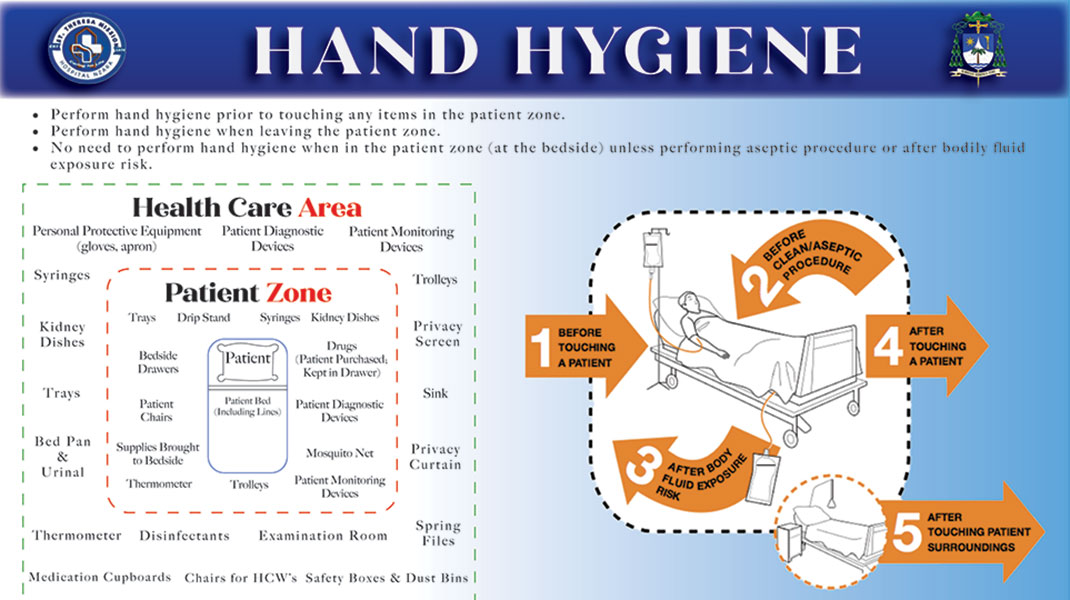
A poster created by the Infection Prevention team that promotes proper hand hygiene in medical care.
They learned that purchasing alcohol-based sanitizer was cost prohibitive. So instead, the team trained staff members, based on WHO guidelines, to produce their own. These infrastructure changes were followed by the development of a formal infection hand hygiene policy. Claire led the committee members through a comprehensive hand hygiene virtual training and created learning materials to support the committee in becoming facilitators—for the rest of the staff and new hires.
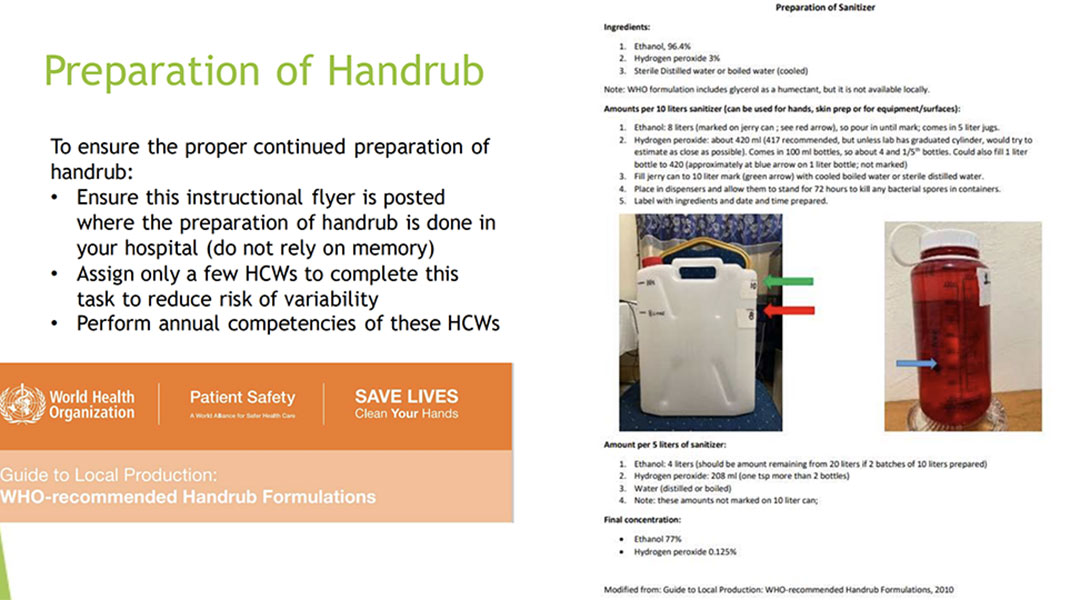
An excerpt from a training session that details local guidance to produce alcohol-based hand sanitizer (handrub).
Where We are Today: Global Recognition for Infection Prevention
Today, the project team has grown to include Ashley Munoz, a pediatric nurse who served at St. Theresa Hospital for six months in 2024. As a long-term medical volunteer, she was able to provide additional training, assessment, and feedback—filling the gaps that could not be addressed remotely. The transformation of infection prevention at St. Theresa coupled with the various additions of volunteer experts over the course of the initiative’s lifespan is an example of sustainable and value-driven volunteerism. At CMMB, our volunteer program is built on respect, local leadership, and a combination of in-person and remote opportunities that promote global partnerships backed by diverse expertise. Though still ongoing, the prevention infection initiative has become so impactful, that St. Theresa has earned recognition by the WHO as the cleanest hospital in South Sudan.
Ashley, Claire, and Dr. Helene are proud of the achievements made under the committee’s current head member, Asunta. In the next section, they share their own words to reflect on collaboration, celebrate St. Theresa’s local team, and recognize transformation.
Progress, Collaboration, and Your Support
A Reflection by CMMB’s Infection Prevention Project Volunteer Team
We have observed Asunta Badi work tirelessly at St. Theresa Mission Hospital to ensure patients are safe from hospital-acquired infections. As the head of the Infection Prevention Committee, she provides education and monitoring and helps ensure infection prevention supplies remain available. With representation from each hospital department, the infection prevention committee’s work resonates through the hospital to maintain best practices. This work has been noticed at the national and global levels. The World Health Organization recognized St. Theresa as the cleanest hospital, with the best infection prevention strategies and knowledge in South Sudan.
This extraordinary work has been a collaboration between US-based volunteers and St. Theresa Hospital’s administration. Online support is bolstered by the occasional placement of an in-person volunteer. The project is a unique way of volunteering. Highly skilled volunteers can be difficult to find. Through remote opportunities, relationships are formed to directly improve staff capacity.
Strong infection prevention strategies and knowledge support will leave an impact well into the future. Together, they build staff capacity and support excellent patient care in limited resource settings. With increased support from donors and volunteers, St. Theresa Mission Hospital has the potential to maintain one of the best infection prevention programs in the East African region.
